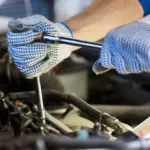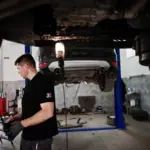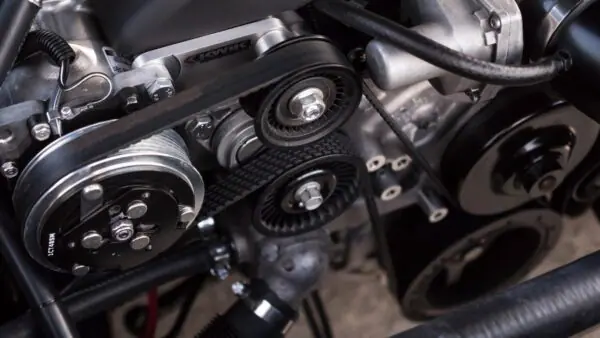Why should we consider what rain does to our cars? Consider how preventative measures can add years to your car’s life.
1. Wax your car thoroughly
Consider it a wise investment to have your automobile waxed and cleaned before the rainy season begins. Once it starts, you will reduce the rust and water spots that are tough to manage. It will also aid in preventing the aging sheen loss of your outside paint.
2. Switch on your air conditioner
The air is more hydrated when it rains. Condensation will form on the windshield and windows. It can increase the risks of driving in the rain, where vision is already significantly decreased. Try turning the air conditioner on, and it can help.
3. Inspect your tires
To maintain enough traction between your car’s tires and the road surface, the grooves of its tires help drain water away from beneath its treads. Older and overly worn-out tires typically have narrower grooves, increasing the chance of your automobile rolling out of control on a slippery surface or harming its sophisticated suspension and steering systems.
Put a penny into the groves on your tires at different locations to see whether they might need to be replaced (Lincoln’s head first). Your tires are in fantastic condition if the tread covers Lincoln’s head. They will need to be replaced if not. Make sure to check the tires’ pressure as well, and if necessary, get them inflated to the specifications.
If you like to be more ‘hands-on’ with your vehicle, please browse our extensive library of manuals for your make and model: Repair Manuals

4. Examine your wipers
Your car’s wiper blades will eventually dry out, grow brittle, crack, and stop making good contact with the windshield. Ineffective wipers can reduce driving sight by leaving distracting smears, skips, and streaks as they sweep the glass.
Consider buying new wiper blades every 6 to 12 months. Bring the originals with you when you buy a new set to be sure the new ones you get are the right length and have connector clips.
5. Examine seals
The rubber seals on the doors, windows, hood, and trunk prevent water from entering your car’s interior. However, as they age, they loosen and increase your car’s susceptibility to leaks. Make sure to thoroughly inspect these seals before the rainy season starts, and then perform any necessary repairs or replacements. Remember to lubricate the door hinges to ensure they are entirely watertight.
6. When it rains, wash and dry your car.
Contrary to popular belief, rain does not effectively wash your car. If, when driving or leaving it parked outside, your vehicle comes into prolonged contact with rainwater, you should immediately wash it and dry it with a towel after the rain stops. Keep in mind rainwater can be corrosive. Rainwater may also contain different mineral and soil deposits. Water spots and stains are left behind after the water evaporates, and they can be pretty challenging to remove on your own.
Make sure not to overlook the car’s bottom when washing it. When it rains, this region is particularly susceptible to mud, road grit, and dirt buildup. Ensure the underside is well cleaned and greased after that unless you want to run the danger of rusting.
7. Examine any electrical wiring.
Electricity and water are not a good match. When it rains, any exposed or incorrect wiring has a significant likelihood of shorting out, endangering the safety of you and any automobile occupants. Examine the wiring’s condition by opening the hood of the car. Immediately replace any wires and cables that are not correctly installed, have insulation that is peeled off, or exhibit corrosion.
8. Inspect the Brakes
A well-maintained car braking system is crucial, particularly on wet roads when stopping distances are frequently greater. To determine whether to have its components fixed or replaced, you should often have your braking system evaluated by professionals.
9. Battery Inspection
Imagine a situation when you are traveling in a downpour, and your battery fails. The wet season is when most battery issues tend to happen. Have your battery tested by a professional before ensuring it is in good operating order, or install a new battery if necessary. Be careful to check the cable connectors for rust or any other corrosion-related symptoms.











